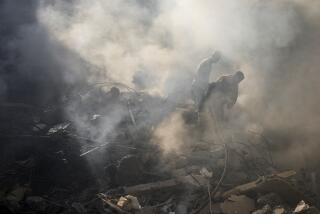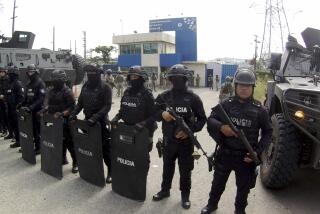Iraqis Raid Envoys’ Quarters in Kuwait; 5 Consuls Detained : Gulf crisis: American diplomat was questioned when French, Canadian and Belgian diplomatic missions were invaded. President Bush hints at possible U.S. response.
- Share via
NICOSIA, Cyprus — Iraqi soldiers stormed the French, Canadian and Belgian diplomatic quarters in Kuwait on Friday, briefly detaining a U.S. consul and several other diplomats. President Bush declared the crackdown “outrageous” and hinted at a possible U.S. response.
The Iraqi troops held five Western consuls for several hours and arrested French citizens as the occupying forces stepped up the pressure on holdout embassies to close their doors in Kuwait city. The U.S. Embassy was not involved in the incidents, but the U.S. consul from Baghdad was detained while visiting at the Canadian ambassador’s quarters.
In a stern warning, Bush said he drew no distinction between the raids on the embassies of American allies and an attack on the U.S. diplomatic compound itself.
The incidents “underscore the brutal behavior of Iraq” and “add up to clear violations of international law,” the President said.
“They do raise tensions; they clearly do,” he added.
The escalation of the six-week-old confrontation interrupted a brief lull marked by diplomatic efforts by both sides to gather allies. It was the first time that foreign diplomatic compounds in Kuwait had been forcibly entered, although they have been under siege and denied supplies for a month.
The Iraqi raids on foreign compounds appeared to be coordinated and aimed at breaking the will of Western diplomats to hold out amid worsening conditions. The U.S. and major European embassies have been denied water and electricity supplies for three weeks, and Iraqi troops stationed outside their walls have prevented anyone from entering or leaving.
French Foreign Ministry officials in Paris said Iraqi soldiers forced their way into the ambassador’s residence at 7 a.m., taking the military attache, Col. Edouard Crespin, and three French civilians to an undisclosed location. Crespin was later released, but the whereabouts of the civilians were not known, the officials said.
The ambassador was out of the country when Iraq invaded Kuwait on Aug. 2, and the embassy has been under the command of the charge d’affaires.
French President Francois Mitterrand, whose country was the main Western arms supplier to Baghdad during Iraq’s 1980-88 war with Iran, called the Iraqi raid “aggression.” Speaking with reporters in Bratislava, Czechoslovakia, during a state visit, he vowed: “We will respond to it.”
French officials said the government would announce its response after an emergency Cabinet meeting today in Paris.
At the Canadian ambassador’s residence in Kuwait, Iraqi troops forced their way in before dawn, according to a Canadian diplomat in Paris. The troops detained the Canadian consul and his counterparts from the United States, Ireland, Britain and Australia, along with six Irish private citizens who had taken refuge there.
The Canadian government said the officials were released two hours later, after their identities as diplomats stationed in Baghdad were established. However, there was no word about the fate of the Irish citizens.
State Department officials said the U.S. consul, whom they refused to identify, had visited Kuwait frequently in recent days to arrange flights home for American women and children. About eight Kuwait-based American diplomats, including Ambassador W. Nathaniel Howell III, remain confined to the embassy there.
Despite the disruption, another flight left Kuwait on Friday, carrying about 300 American women and children aboard a U.S.-chartered Iraqi Airways 747 jumbo jet. The group was expected to reach the United States today. A U.S. Embassy official in Baghdad said about 1,500 Americans remain trapped in Kuwait.
In the third incident, Belgian officials said three Iraqi soldiers entered Brussels’ diplomatic compound and tried to force its two remaining representatives to abandon the embassy. The diplomats fled into the ambassador’s residence adjoining the embassy building.
In the Netherlands, meanwhile, the government disclosed that Iraqi troops had forced their way into the home of its ambassador to Kuwait, Joop Veling, earlier this week. No details were available.
The official Iraqi news agency in Baghdad denied the reports without further comment.
In Paris, Iraqi Ambassador Abdul Razzak el Hashimi was summoned to the ministry to explain the incidents in Kuwait. He denied that the 1961 Vienna Convention, governing diplomatic relations, had been violated.
“There is no government of Kuwait,” Razzak said. “There is no state of Kuwait. So the Vienna Convention does not apply. . . . These people in Kuwait are no longer diplomats because there are no longer embassies there.”
Two weeks after invading Kuwait, President Saddam Hussein’s regime ordered the more than 60 foreign embassies there to shut down by Aug. 24 and to move their staffs to Baghdad. Iraq insists that Kuwait no longer exists as a sovereign state, that it is now Iraq’s 19th province and that all diplomatic representation must be based in Baghdad.
In the month since the order was issued, more than 40 countries have complied, almost all under protest. The U.S. Embassy and 16 others are continuing to resist Iraqi pressure despite meager supplies of food and water. At last report, U.S. Ambassador Howell and nine of his officers were holding out by drinking purified water from the embassy swimming pool.
The most recent embassy to give up was that of Egypt, two days ago. Like other nations that have withdrawn their diplomats from Kuwait, Egypt has said the embassy remained operational in principle and that Cairo still recognizes Kuwait as an independent country.
From Washington, Bush spoke by telephone with Mitterrand. The President said he told Mitterrand the matter is “of grave concern” and promised to support whatever action the French president takes.
Asked if the raids on the embassies would prompt an escalation, Bush said: “When an escalation is required from me, Saddam Hussein will know it.
“I’m not rattling sabers. . . . When I rattle a saber, the man will know it,” the President added.
At the State Department, spokesman Richard Boucher denounced the Iraqi intrusions as “another example of Iraq’s blatant disregard” of a U.N. Security Council resolution instructing Iraq to respect diplomatic missions in Kuwait.
The spokesman noted that Friday’s incidents were “only the latest in what is a growing number of violations of diplomatic missions in Kuwait by Iraqi occupation forces.”
Boucher said the U.S. deputy chief of mission in Iraq, John Wilson, had protested the incident to the Foreign Ministry in Baghdad.
Similarly, in London, British Deputy Foreign Secretary William Waldegrave said angrily: “It’s another fairly grave threat. It’s consistent with the illegal position the Iraqis have taken throughout.”
But he said it was not clear whether the Iraqi troops involved were renegades or were acting on instructions. He said the nations of the European Community have all agreed to assume responsibility for each other’s nationals if it comes to the point that their embassies can no longer hold out.
By moving against the French, the Iraqis attacked a potential moderating force in the gulf conflict. Although the French military deployment is the second-largest in the region after America’s, France has opposed offensive military action against Iraq.
But Iraq is known to feel betrayed by France, which was an important weapons supplier during Iraq’s eight-year war with Iran. In much the same way that the United States once depended on Iran as a crucial anchor in the Middle East, France depended on Iraq. The relationship began to fade after Iraq fell behind in payments on $4.5 billion it owed France, mostly for weapons.
In a recent interview on French television, Hussein was sharply critical of France.
“The only blame we have is against France,” he said. “We don’t directly blame the United States or Great Britain because they were never objective. They were never our friends.”
Williams reported from Nicosia and Gerstenzang from Washington. Staff writers Rone Tempest in Paris, Douglas Jehl in Washington and Mark Fineman in London contributed to this report.
More on Gulf Crisis
ARAB SOLUTION--Secretary of State Baker and Syrian President Assad agreed that Arabs should take the lead in solving crisis. A6
JAPAN EFFORT--Tokyo plans to send medics to the Mideast, but is debating whether to include servicemen in its personnel. A6
DEPLOYMENT--Britain said it will send its famed “Desert Rats” armored brigade to Saudi Arabia. But it will take weeks. A6
TECHNOLOGY--U.S. officials split over selling supercomputer equipment to Brazil. Some experts say it could aid Iraq. A11
More to Read
Sign up for Essential California
The most important California stories and recommendations in your inbox every morning.
You may occasionally receive promotional content from the Los Angeles Times.













